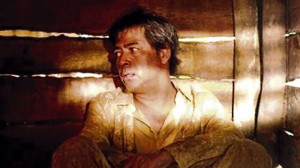John Sayles’s “Amigo” tackles a little known episode in history: the 1899-1902 Philippine-American War.
“I felt like there was a kind of vacuum, that a conversation was not being had about this moment in both Filipino and American history that needed to be restarted,” said Sayles at a recent forum held at the Philippine Consulate.
With “Amigo,” he said he meant to tell this story — not as a massive historical epic, but simply as a snapshot.
At the center of this cinematographically beautiful fiction set in 1900 is cabeza de barangay Rafael Dacanay (Joel Torre), whose family is torn apart by the war. He and his wife grudgingly cooperate with the American soldiers who occupy their village and their home, but his brother and son are insurgent guerrillas fighting U.S. forces from their mountain hideout.
When the American general (Chris Cooper) puts pressure on Rafael to surrender his brother by leading the troops to the rebels’ hideout, the movie picks up in pace and emotional conflict. How Rafael struggles to survive the American occupation and still respect the principles advocated by his brother is at the core of “Amigo’s” message.
“Those are hard decisions,” said Sayles, “but it seems to be the central conflict for Filipino people at that time.”
“It’s very hard to tell the good amigos from the bad amigos,” he continued, expounding on the meaning of friendship in a time of war. “They seem like really friendly and nice people, but then they’re the ones who shoot us. And we can’t tell them apart. It’s hard to tell a guy whom we had a nice conversation with in sign language in the morning, is the same guy who shot us when the lights are gone at night.”
Producer Maggie Renzi said the film is not worried about offending anybody.
“John’s never worried about being politically incorrect in his life,” she said, describing Sayles as a storyteller and a humanist.
What Sayles cared about, she said, is “people and telling as much of the truth as he can. And how he does that is by showing you every side of each of the people who are in the movie.”
The filmmakers explained how they made the Filipino and American characters multi-dimensional by showing both their admirable and unmentionable traits. For instance, the Filipinos’ love of family, fiesta and power; and the Americans’ trying to fully comprehend and also manipulate the natives.
“Now, is this (movie) anti-American? Will Americans come off in a bad light? Each character portrayed in the movie draws the audience in different ways. And John is really good at creating a whole world of people,” said Renzi.
“It’s a shame that he (Sayles) knew our history more than us,” actor Joel Torre told The FilAm. A longtime friend of Sayles, he co-produced “Amigo” with Renzi.
The movie, according to Torre, banners an anti-imperialist theme. While Philippine-American relations are often characterized as one of “deep friendship,” he said the war belies that.
“Contrary to popular belief that America has always been a friend and big brother to the Philippines, the two nations had in fact started on a bad note,” he said.
Torre said the movie title is about how the word “amigo” was used ambiguously during the war. “It’s the term Americans used to call Filipinos — good or bad — at that time.”
Then he wondered, “We already declared our independence, we were ready for our republic and it was taken away from us. So, what if the Americans didn’t come, our life would have been different. And so would theirs. There wouldn’t be a world power.”
As for the movie being too long and dragging in some parts, Torre quipped: “It’s an indie, not a commercial movie.”
“Amigo” is playing in select U.S. theaters until September.
